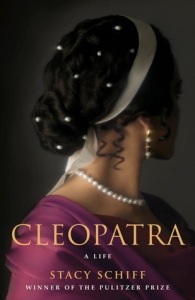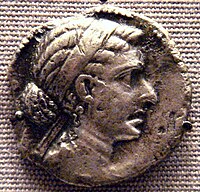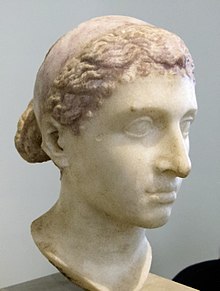“Cleopatra: A Life” by Stacy Schiff
 I have a soft spot for strong women in history. I’ve written about Hypatia, the Lady Philosopher of Alexandria; Empress Galla Placidia and her niece Pulcheria who both ruled Rome in its waning days. I’ve read about Boudica, Queen of the Iceni; Amanirenas, the one-eyed warrior queen of Kush; and Zenobia, Queen of Palmyra; all of whom defeated Roman armies, only to succumb later to that massive military machine. Most of my favorites are little known women who ruled countries, commanded armies and navies, dealt astutely with ruling male neighbors and made a difference in their people’s lives. I like to read and write about them because they are little known. I like introducing readers to new characters and broadening the scope of history. Occasionally, I’ll run across a woman I thought I knew, and find out I’m wrong. Cleopatra is one.
I have a soft spot for strong women in history. I’ve written about Hypatia, the Lady Philosopher of Alexandria; Empress Galla Placidia and her niece Pulcheria who both ruled Rome in its waning days. I’ve read about Boudica, Queen of the Iceni; Amanirenas, the one-eyed warrior queen of Kush; and Zenobia, Queen of Palmyra; all of whom defeated Roman armies, only to succumb later to that massive military machine. Most of my favorites are little known women who ruled countries, commanded armies and navies, dealt astutely with ruling male neighbors and made a difference in their people’s lives. I like to read and write about them because they are little known. I like introducing readers to new characters and broadening the scope of history. Occasionally, I’ll run across a woman I thought I knew, and find out I’m wrong. Cleopatra is one.
Cleopatra VII, the last Macedonian Greek Ptolemy to rule Egypt, is one of those historical characters that everyone thinks they know because she is so enmeshed in popular culture. The subject of plays, books, movies, art; all with the same theme: beautiful woman seduces the most powerful men of the age, gets her comeuppance by falling passionately in love, betrays her lover in his hour of need and commits suicide by snakebite. All agree on some central tenants: she was physically beautiful; was profligately sensual, using sex, food, drink and other delights of the senses to ensnare her victims; and she was highly ambitious.

A tetradrachm of Cleopatra VII, Ascalon mint
If you read the classical writers, she’s all that is anti-Roman in the world: a woman, a queen, an Eastern ruler who worships strange animal gods. To male-dominated, republican Rome, she’s a mystery and a threat to their very way of life. But the real Cleopatra is obscured by myth and legend. Octavian (later known as the Emperor Augustus) and his publicists probably manipulated her image to enhance his own as her conqueror. We don’t even have a good likeness. I saw a museum show about Cleopatra several years ago and they had a couple of busts which may, or may not, have been her. All we have for certain are a few coins which show a woman with a prominent nose and sharp chin.
Most that was written about her was written after her death, by her enemies. A few authors, in recent times, have tried to pull back the veil of mystery surrounding the legends of Cleopatra. The most recent is Cleopatra: A Life by Pulitzer-award winning author Stacy Schiff. I picked up this book because it was getting a lot of buzz on various history and reading sites for being a lucid, easy-to-read, modern biography of Cleopatra. I wasn’t disappointed. Schiff tells us early on what she wants to accomplish:
To restore Cleopatra is as much to salvage the few facts as to peel away the encrusted myth and the hoary propaganda. She was a Greek woman whose history fell to men whose futures lay with Rome, the majority of them officials of the empire….There is no universal agreement on most of the basic details of her life, no consensus on who her mother was, how long Cleopatra lived in Rome, how often she was pregnant, whether she and Antony married, what transpired at the battle that sealed her fate, how she died….I have not attempted to fill in the blanks, though on occasion I have corralled the possibilities. What looks merely probable remains here merely probable—though opinions differ radically even on the probabilities. The irreconcilable remains unreconciled. Mostly I have restored context.”
There is a lot of context. In addition to telling us about Cleopatra and other leading players on the stage; Schiff fills in lots of details about the city of Alexandria and the lives of people at those times. We have pageantry, economics, palace intrigue, architecture, global politics, food, medicine and childcare, among many subjects. She also does the scholar’s job of evaluating the sources and putting them in context. Who had an axe to grind, who worked for whom, how did their commentary on Cleopatra fit in with their life’s work. As Schiff says, Cleopatra “ceases to exist without a Roman in the room.” She points out that the most comprehensive sources never met Cleopatra. Plutarch, Appian and Dio all lived after she died and for their own purposes:
…conflated accounts, refurbishing old tales. They saddled Cleopatra with the vices of other miscreants. History existed to be retold, with more panache but not necessarily greater accuracy. In the ancient texts the villains always wear a particularly vulgar purple, eat too much roasted peacock, douse themselves in rare unguents and melt down pearls….Cleopatra’s was a world in which you could visit the relics of Orpheus’s lyre, or view the egg from which Zeus’s mother had hatched. (It was in Sparta.)”
Schiff’s book, like any good non-fiction history, is well documented. She provides forty pages of end notes, a selected bibliography and extensive index. But it reads like a novel, even to the extent of putting thoughts in the heads or giving feelings to some of the characters (which I think is a mistake in non-fiction.) She gives us a portrait of an intelligent, pragmatic ruler. Cleopatra held on to power for twenty-two years in the face of the most ambitious men of her age, prosecuted wars, alleviated famines and controlled one of the largest economies in the Ancient world. Based on Cleopatra’s actions, background, and the times she lived in; Schiff gives us a character that rings true. Whether or not it is accurate, no one will ever know.
Here’s an interview with Stacy Schiff at Border’s Bookstory on her book Cleopatra: A Life:
The details:
- Title: Cleopatra: A Life
- Author: Stacy Schiff,
- Publisher: Little, Brown and Company ( 2010)
- ISBN: 978-0-316-00192-2
- Format: hardback, 369 pages
- Price: $29.99

This book was superb. I loved how Schiff explained why Cleopatra was depicted the way she was. It could be as simple as not delivering a book after the death of a loved one or just being a woman who wasn’t Roman. How sad. I personally believe that given the chance this woman could have been remember by history as an innovator, and one who would ultimately change the world.
I also loved this book. It takes amazing talent to create a book which, as you say, reads like a novel, but has the incredible historical integrity of this one. One of my favorite books in recent reading.
I started reading this book a while ago and actually didn’t finish it because I thought it was really boring. Though I am interested in learning more about the legendary Cleopatra.